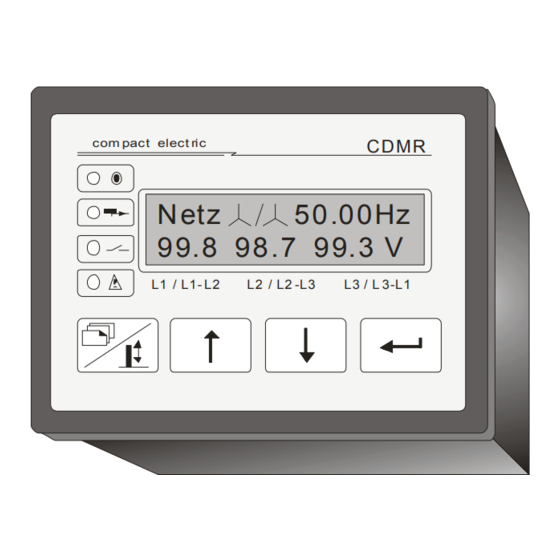- ページ 7
リレー Compact Electric CDMR-62のPDF ユーザーマニュアルをオンラインで閲覧またはダウンロードできます。Compact Electric CDMR-62 13 ページ。 Digital line monitoring relay, 3x100v/57v ac

Mains monitoring relay CDMR-62
The CDMR-61 is equipped with a real-time clock with a supply-buffer of 60 hours minimum. The time resolution is 1s.
Date and time of the internal clock are displayed in a menue of the "General Settings" chain. The clock settings may be
changed in this menue as well as by the PC program.
Clock setting by menue: see chapter "Change of setting values". The first flashing value is the "day", it may be incre-
mented or decremented with "UP/DOWN" arrow
procedure till "seconds" value. After the last entry of the ENTER key flashing of seconds stops and the new date/time
settings are transferred to the realtime clock.
Event History Buffer featuring 100 events capacity
If the relay detects a fault-free line conditions (none of the selected monitoring functions energized) for more than 200ms,
the event trigger logic is activated waiting for the first tripping event. This event is recorded with date and time and the
corresponding line measurement values at the tripping instant. Up to 100 events are stored chronologically. On exceed-
ing this number the oldest event is overwritten.
The content of the history buffer may be displayed on the LCD panel or via the serial interface by a PC program. The
complete information of one event is splitted in two menues. From the menu "Event Monitoring" press the ENTER key to
branch to the:
H00:
28-05-2005
U<<<
13:48:16
To display previous events press M/V key, "Hnn" flashes, now the event number can be scrolled from 00 to 99, the cor-
responding event information is instantly displayed. To check the measured values corresponding to any event,
press M/V key again to stop flashing then step to the 2. Event menue with the "DOWN" arrow
H00:
U<<<
005V
230V
216V
The entries 00 to 99 can be selected using this menu. The flashing can be stopped – as explained above – for an inter-
esting event and a transfer to the event menu can be performed using the "Arrow up" button, which displays the date and
the time of this event.
Erasing the complete event history buffer:
In the menue "Event Monitoring \ H00-99 Erase" set the parameter value to 1. The erasing procedure takes about 30s.
Don't press any key during this procedure, cause it terminates the procedure in an incomplete state.
Blockage Time and Blocking Relay
Menu "General settings":
These two parameters can be used to adhere to the required brake time between a triggering event and the restart of the
circuit breaker without an external time relay The relay (K1..K5) defined as blocking relay will also be activated during
each triggering and the blockage time will be initiated. If the grid is faultless again, then the blockage time starts to run
and the blocking relay releases only after this time has expired. The blockage time is also effective after the relay power
supply has been connected and the grid is fault free.
External blockade input
Depending on the settings of the parameter "Ext. Blockade U,f" (in menue block "General settings"), the external block-
ade (see Fig.1, Connection "B" and "N" closed through floating contact, triggering time 40 ms) has the following effect:
„Ext.Blockade U,f"
0 .................... The blockade acts only based on the vector surge trigger "Vs".
1 .................... The blockade acts only on the excitation and triggering of Vs>, U<, U<<, f<, f<<, f>, f>>, Asy.
2 .................... Blocking of all 13 monitoring functions. If blocking is released and a line fault present, tripping is
Self-monitoring
CDMR62e_man_A1.doc
/ Operating instructions
keys, press ENTER key to step forward to "month" value and repeat
1. Event menu
Hnn =
Event number (H for "History", 00 = newest entry, 99 = oldest entry
U<<<
tripping function
2. Event menu
1. Line: Event number (Hnn) from the first event menu and tripping function,
2. Line: Measured values at the instant of tripping
Effect
If the blockade is released and if a line fault is present, tripping is performed after the time
delay programmed for the corresponding monitor function.
performed after the time delay programmed for the corresponding monitoring function.
Page 7
key :
